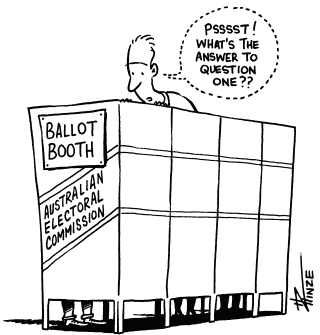 |
|||||||||
|
|
|||||||||
Responses to common arguments supporting compulsory votingRepresentation
Legitimacy
Human Rights
Improving Political Awareness
The Poor and the Marginalised Other Arguments
Representation Voluntary voting plays into the hands of conservative political parties who would benefit from it. This is not a universally held opinion. Some say that in the long run no ideologically based parties benefit from it. However even if it were true it would not be an argument to oppose voluntary voting. If voluntary voting favours conservative parties then the corollary must also be true that mandatory voting similarly favours socialist type parties. Obviously one needs to utilise more justifiable arguments to support an electoral system rather than just the self serving interests of keeping the other parties out. With voluntary voting small extremist political parties, who possess dedicated followers not needing to be forced to vote, would have a greater influence on the political system than their numbers otherwise represent. “In each of the last four elections, the Democrats and the Greens would have had a higher vote share if there had been a voluntary voting regime.”1 This argument invites two responses. Addendum: The irony is that when mainstream parties say that voluntary voting distorts the electoral system to the advantage of extremist parties, so called extremist parties can just as legitimately say that compulsory voting distorts the electoral system in the favour of the major ‘middle of the road’ parties. “...[compared to] the US Presidential Election of 2000 (51% voting) and Britain’s General election of 2001 (59% voting) compulsory voting serves to maintain high voting turnout in Australia.” - Lisa Hill1b Yes, and introducing conscription makes military recruitment easier. But just as a conscripted army isn’t as good as a volunteer one, decisions made by a group which includes those who don’t care, aren’t as good as those made by people solely with an interest in the subject. “Only the complete population supplies the accurate picture of the electorate’s view”.2 It is hard to imagine how adding the input from those who either don’t care or don’t know is going to make the picture more accurate. While it is important to emphasise that under the principle of democracy anyone has the right, if they can bother to get themselves to a booth, to vote for someone who has promised them lower taxes together with free lunches, shorter working hours and longer paid holidays as well as peace in our time, it would seem rather ridiculous to have legislation which forces this type of person, more than anyone else, to vote. “[under a] voluntary system… all of those who voted, did so because they wanted to vote and had given consideration to their choices. ‘Quality is always better than quantity.’” Submission to the JSCEM3 “Compulsory voting…the bigger the vote, the more representative the government, the healthier the democracy.”4 If a marine engineer, truck driver or dental nurse was asked to give a preference as to which economic system is better for the country, either Keynesian deficit spending or supply-side economics, then, at the threat of a fine or imprisonment each well might give an answer. However it might to fair to say that, without the threat, modesty or a lack of interest in the subject would tend to induce many to abstain. It would certainly be quite incongruous to declare that the economic health of the country would be improved from the input of those who don’t know what they were voting for. If in an election 30% vote for party A, 25% vote for party B and 45% stay home because they either don’t care or their interest is so small that it is not worth the trouble of voting, then the result will be that 30% will have no complaints about the result, another 45% will also have no complaints (as they are relatively indifferent to the result) and only the 25% minority will suffer. However if the uninterested were forced to vote then they may well tip the balance over to the side of the interested minority, in which case the result will be that 25% will have no complaints while the 30% will. This would hardly make for a healthy democracy, when, of those who care and are prepared to make an effort, the majority is defeated by the minority. Legitimacy “…full participation provides electoral outcomes with greater legitimacy”5 In 1994 John Howard, who was later to become Australian Prime Minister, declared a 38% midterm election turnout in the United States as ‘largely meaningless as a reflection of American political opinion in 1994’6. Four years later his own Liberal Party won the 1998 federal election with 217,000 fewer votes than the Labor opposition (see below). One might guess the Prime Minister did not see any reason to question the legitimacy of that election. Under a voluntary system people who don’t vote, don’t, either because they have no confidence in either of the two major party candidates on the ballot paper (single seat electorates), or because of the fact that they really just don't care about the process of government and who it is who is elected. Addendum Without getting into too much detail in a debate about the virtues or vices of single member electorates as compared with proportional representation, one undeniable aspect is that with single member systems you only have two viable options when voting. This in itself would deter many people from bothering to vote as they realise there is no chance their preferred (minority) candidate can win a seat in Parliament. This might explain why most European countries which use proportional representation manage a voluntary 80% turnout while countries like the United States and the UK, with majoritarian systems have only approximately 50% of eligible voters actually voting. In Australia no winning candidate for the more influential lower house of the federal government or any state (except Tasmania) would, if voting were voluntary, appreciate the publication of statistics which reveal that they represent only a slim majority of the half of eligible voters who would probably bother to vote. (i.e. approximately only 26% of public support) The proper response to this embarrassment might be to introduce proportional representation where, apart from the fact that less popular parties could never steal elections (see below), best estimates are that winning candidates would represent up to 75% of each MPs’ proportion of the population of eligible voters. A less respectable response might be to force the public to vote anyway and then claim that their vote, however uninterested, is a vote of support and legitimacy for the winning candidate. “With voluntary voting it would be possible to end up with a government the majority disapprove of because many of the disapproving did not vote.”-John Howard6 In fairness, the only people justified to complain about the government are those of the voting minority who chose to vote for an alternative party. There is a concept in the Common Law known as “volenti non fit injuria” which, expressed in Torts law, means that a person cannot bring action for harm done to them if they were initially willing to accept that potential harm. In Administrative Law it is manifested in the principle that if you consciously waive the right to remove a potentially biased adjudicator then when the decision affecting you is eventually made, you have no right to claim the decision was biased. By not voting it means that you have waived your right to have an input into the democratic process and are prepared to accept whomever may win power. Therefore if you failed to exercise your right to vote then it follows that you surrender your right to complain about whatever party wins government. It would seem hypercritical to complain about a government one was too lazy to vote against in the first place. "In Australia and other countries, the civic duty to vote reconnects those who are distanced from the democratic and political process, producing consistently high turnouts without any complaints whatsoever about infringing individual liberty." British MP Peter Hain7 This seems to imply that high turnouts are virtues in themselves. Why should that be? One might think that electoral virtues would be that the number of seats a party wins is proportional to the number of votes it gets, or that as much as feasible parliament comprises the full spectrum of political viewpoints that exist throughout the land. Neither of these attributes exist for Westminster, the British Parliament (in May 2005, the British Labour Party won 55% of the seats with 35% of the vote), and yet Secretary Peter Hain seems to think that the solution to electoral problems is to add to the voters’ roll those who don’t know or don’t care. Human Rights “Actually the term ‘compulsory voting’ is a misnomer. It is only registration and attendance at a polling place … that is compulsory. Because of the secret ballot the Australian Electoral Commission (AEC) may not seek to compel people to mark their ballot paper.” - Lisa Hill8 No, that is not quite the case. Section 245 of the Commonwealth Electoral Act 1918, titled ‘Compulsory Voting’ declares in Subsection (1), ‘It shall be the duty of every elector to vote at each election.’ [emphasis added]. By law you actually do have to vote. To say not voting is legal because the AEC can’t spy on you is like saying snorting cocaine in the privacy of your home is legal because police don’t have the right to do random house searches. The fact that it is difficult for the authorities to prosecute those who commit certain infractions of the law does not make those actions any less a crime. If a voter happened to mention in front of witnesses that he deposited a blank ballot paper into the box then he/she would in fact be liable to prosecution. “Opponents of compulsory voting try to make something out of a proposition that compulsion is inherently undemocratic. Yet these same people have no objection to compelling people to pay taxes; some of them favour compulsory (sic) conscription.” - Chris Publick9 Whatever the virtues of compulsory taxes or military service, there can be no denying that at least the state does receive some tangible services. From a financial or security point of view the country is better off when these programs are in existence. However, as described in Is Voting a Duty? what benefit does the state even get if we are indeed to take the il-liberal steps of violating the freedoms of the people? How is the community as a whole better off because one segment is forced to vote? Even the defenders of compulsory voting don’t declare that the otherwise non-voters are somehow more enlightened and wise and improve the mix with their contribution. The inconvenient truth is that the reason freedoms of the people are being violated is so the major parties don’t have to go to the trouble of getting out their vote on polling day. "In Australia and other countries, the civic duty to vote …[produces] consistently high turnouts without any complaints whatsoever about infringing individual liberty."10 After the Australian 1993 federal election at least 43 non-voters who had failed to pay their fine received sentences of one or two days in gaol. It is hard to imagine how there would be no “complaints whatsoever” from forty-three people facing gaol because, on a point of principle, they refused to vote. “I bet any one of those 1.4 million [Australian non voters] would bleat like a banshee if they thought any of their rights were being violated. But the idea that the preservation of those rights might rely on even a very modest level of responsibility has clearly eluded them.”10B This argument appears to imply one of two unspoken premises: either if the non interested were not forced to vote then eventually practically no one would vote and the democracy would descend into a dictatorship by a remaining handful of voting fascists; or that the average politically concerned citizen who would vote, the remaining 60% judging by international standards, have more of a totalitarian streak than the average and in their voting hands the country would in time also descend into a rights-violating dictatorship. Improving Political Awareness "In Australia and other countries, the civic duty to vote reconnects those who are distanced from the democratic and political process..."11 The following is an extract, starting at page 24, of the June 1997 ‘REPORT OF THE INQUIRY INTO ALL ASPECTS OF THE CONDUCT OF THE 1996 FEDERAL ELECTION AND MATTERS RELATED THERETO’ by the Australian Federal Parliament Joint Standing Committee on Electoral Matters. In his second reading speech, the Senator responsible for the 1924 private member's Bill (Nationalist Senator Herbert Payne, Tasmania) predicted that within "a short time" of the introduction of compulsory voting, there would be a "wonderful improvement" in the political knowledge of the Australian population. As demonstrated in a national survey conducted in 1994 by ANOP, compulsory voting has singularly failed to achieve this aim. The results of the survey were published in the Report of the Civics Expert Group established by the former government in 1995. The report stated that the survey results indicate widespread ignorance and misconception of Australia's system of government, about its origins and about the way in which it can serve the needs of citizens. On nearly all subjects the national civics survey found a minority of informed citizens. The majority admitted scant knowledge and their actual understanding was often lower than they professed. (details)
“It forces even the most cynical individual to at least cast a fleeting glance at the political process and that is a desirable outcome. An outcome we should cherish.” - Greg Barnes12 By letting the helm of state be influenced by those who either don’t care or don’t know (apart from their fleeting glance at political posters on their way from the pub to the polling booth) it does seem rather an expensive and precarious way to spread the learning of civics. Wouldn’t it be a lot safer to offer no-charge evening courses, perhaps with free beer as an inducement?
The Poor and the Marginalised “The beauty of compulsory voting is that it, as the APL paper notes, ‘plays a crucial role in reducing the social bias in turnout. In voluntary systems it is the poor and the marginalised who are the non-voters’." - Greg Barnes13
“It is often the least articulate who are prone not to vote, but their contribution can provide for a more thoroughgoing pluralism”14 Those who are too lazy to vote might also happen to be less articulate than the norm, but the reason they don’t vote isn’t their lack of coherence, it’s because they are lazy. A parliament of diverse voices is the essence of democracy. It is what separates us from the despots and thugs who run the ‘one party states’ that unfortunately blot other parts of the world. Representative government of divergent interests is the challenge of democracy whereby all ideas held by concerned citizens are debated in parliament, the most public of all forums. Sometimes minority extremists will also win a place in this most hallowed of institutions. The resulting problem of divisiveness, conflict and discord must always be endured for sake of allowing all segments of the community their fair turn at the lectern. It is an absolute that no matter how popular a contemporary issue is, the majority must always allow those few opposing their limited attempt at parliamentary obstruction. But why have obstruction for the sake of obstruction? If there is a minority of citizens who oppose the beliefs and values of the majority and who earnestly want to be heard then yes, they must be heard. But if there is a minority who allegedly differ in their opinions from the rest, but ultimately could not be bothered complaining, then does the community really owe them a voice? Pluralism, the existence of differing points of view, is nothing to be ashamed of but ultimately we must come to recognise what it actually is. It is disagreement. Diversity in the market place and in our culture is a wonderful thing-- it brings a richness to our lives. But in democratic politics it ultimately means that legislation passed does not suit everybody. Those who earnestly object must be allowed to stand up and speak their minds, but it is quite ridiculous to maintain a system where there must be further, artificial obstruction from those who simply don’t care. “...in voluntary voting systems turnout is heavily skewed in favour of the well-off”- Sally Young18 Is that because everyone has to pay $50.00 to enter the polling station, or because polling stations are only placed in the wealthy suburbs of every city? No citation is given to substantiate that bizarre claim, and it appears that the systems are “skewed” for no other reason than the fact that fewer poorer people per capita happen to turn up to vote, even though the accessibility is the same no matter how rich you are or wherever you may live. “...the abominable US health-care system, expensive university education and the… leaky welfare safety net [are the result when] Politicians can disregard the needs of [poor] non-voters.” - Sally Young19 It is revealing here that Ms Young only looks at the right to vote as a vehicle for self-interest. Are we to believe that because people are poor they therefore have no concerns for crime and law and order, or the health of the nation’s economy, or global warming, or fundamental civil rights, or rights for minorities, or world peace. Apparently she believes that they will only vote for whoever can give them the biggest handout. This would thus lead one to suspect that she either believes that that is an acceptable criterion for voting, or that poor people are beyond the capability to exhibit any civic responsibility.
Other Arguments “As no large campaign funds are needed with compulsory voting to goad voters to the polls, the role of money in politics will decrease.” - Arend Lijphart15 It hard to believe politicians will be sending donors’ cheques back because one item of their expenditure has been curtailed. Not only are posting pamphlets, and newspaper and television ads quite expensive, campaign funding is never finite and there can always be extra methods, finance permitting, to get the message out. High levels of participation decreases the risk of political instability created by crises or dangerous, charismatic leaders (e.g. Adolf Hitler)16 Studies have shown that non voters are generally from the poorer, less educated classes. We are to believe that they, who know less about history and civics, are to be less swayed by charismatic dangerous leaders? “Compulsory voting ensures there is no possibility that people can be intimidated or prevented from voting in areas where intimidation of certain demographic groups may exist.”- Wikipedia17 Where it might exist it is hard to image how compulsory voting could remedy this problem. Countries that enforce voting do not make abstinence a capital crime. If a reason for failing to vote is not accepted (and one would think fear of grievous bodily harm a good excuse) the fine then paid generally does not exceed $100. What sane person would risk life and limb confronting a couple of baseball bat wielding thugs simply to evade paying $100. Polling shows that approximately 70% of Australians favour compulsory voting. This may well be true but it’s hard to see what that actually proves in this case. Politicians should always be responsive to those they represent and should be ready to legislate or otherwise act when the electorate voices concerns about its welfare being effected due to, for example, a proposed change in economic policy, an engagement in a foreign war, punishment for crimes being too severe or too light, specific reactions to the global warming threat, or certain categories of the citizenry being denied the vote.
The vote counting quirk of single member voting “[Reforming the electoral system towards proportional representation] is not a radical proposal.
Extract from Representation and Institutional Change, ‘Papers on Parliament No. 34’, December 1999, Department of the Senate, Canberra. pp116-117.
|
|
1 Derek Chong, Sinclair Davidson and Tim Fry ‘It’s an Evil Thing to Oblige People to Vote.’, Policy Summer 2005-06 vol. 21 no 4.
|
| [Home] [A Duty?] [About Us] [FAQ] [Donkey Vote] [Links] |
 |
|||||||
 |
|||||||
 |
|||||||
 |
|||||||
